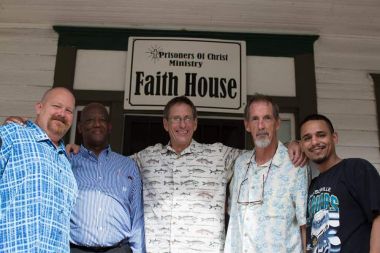Atheist group yields after Florida judge rules in favour of Christian ministries that help rehabilitate ex-prisoners

An atheist group has given up its eight-year fight after a Florida judge ruled in favour of two Christian ministries that have been helping in the rehabilitation of former inmates from drug and alcohol addiction.
"Therefore, a dispassionate review of our chances on appeal indicates we likely would lose and, moreover, we may well create bad precedent that would eliminate our hard-won victory and hurt the chances of other litigants," declared plaintiff Center for Inquiry in giving up the fight.
It added, "Accordingly, we have concluded the responsible course of action is not to appeal this adverse decision. Admittedly, we are coming away from this multiyear litigation with only half a loaf, but that's better than nothing."
As earlier reported by Christian Today, the Council for Secular Humanism originally filed the case in 2007 against the Florida Department of Corrections to void its contracts with the Lamb of God Ministries and Prisoners of Christ Ministry for violation of the Florida Constitution's "No Aid" provision.
The law states that "no revenue of the state or any political subdivision or agency thereof shall ever be taken from the public treasury directly or indirectly in aid of any church, sect, or religious denomination or in aid of any sectarian institution."
However, Judge George Reynolds III of the Circuit Court of Leon County, Florida, ruled that the No-Aid provision allows government contracts with religious organisations if the funds are not spent "in aid" of religion but to advance the state's secular goals.
In the case, the judge said, the payments by the Department of Corrections to the two organisations "are not being made 'in aid of' religion. The Program exists to promote the State's anti-recidivism and anti-addition interests, not religion."
He said "the record shows that the Program does not indoctrinate, require participation in religious ritual, or favour any one religion over another."
Reynolds said "under the contracts, participation in the DOC program is voluntary. The DOC program is open to clients of any faiths and of no faiths. Any religion content is optional. Both contractors are led by men with religious training and background."
The court said the two organisations provide housing, employment assistance, transportation and food for their clients that start when the prisoners are released and are met by the contractors at the bus station.
The Lamb of God and Prisoners of Christ help them "adjust to life outside prison and come up with a plan based upon each client's needs."
In addition, they help them get social security cards, driver's licenses or ID cards, transportation, medical and dental services, mental health services, food stamps, GEDs and post-secondary education.
The judge concluded that "under the disputed facts of the case, based on 8 years of litigation and a lengthy record, Plaintiffs have not demonstrated that state funds are being unconstitutionally used 'in aid of' a 'church, sect, or religious denomination or . . . any sectarian institution."
"Men leaving prison don't have much hope for a stable job, food, or even a roof over their heads. But these religious groups have given them hope, and so much more," said Lori Windham, senior legal counsel of the Becket Fund for Religious Liberty, which represented the two organisations. "These ministries need to focus on helping men stay sober and turn their lives around, not defending against an unending, meritless lawsuit."











